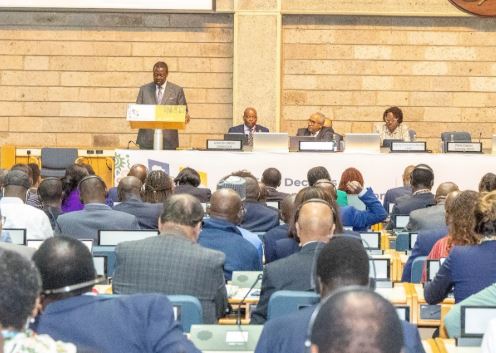
Prime Cabinet Secretary Musalia Mudavadi has called on African nations to radically rethink their approach to environmental challenges, urging a shift from dialogue to decisive action.
Speaking at the official opening of the 20th Ordinary Session of the African Ministerial Conference on the Environment (AMCEN), Mudavadi underscored the urgency of innovation, investment, and inclusion in tackling the continent’s mounting ecological threats.
“Africa must now centre its conversations around actionable solutions,” Mudavadi said during the landmark session held at the United Nations Environment Programme (UNEP) Headquarters in Nairobi.
He emphasied the importance of climate-resilient financing, the transformative role of artificial intelligence and early warning systems, and the urgent need to include youth in environmental decision-making.
“Above all,” he added, “We must continue to advocate for a stronger role for our youth in shaping environmental policy and action, recognising them as a dynamic force and indispensable partners in charting Africa’s path to a sustainable and resilient future.”
This year’s AMCEN, themed “Four Decades of Environmental Action in Africa: Reflecting on the Past and Imagining the Future,” marks 40 years since the conference's inception—highlighting its evolution into a critical platform for uniting Africa’s voice on the global climate stage.
“Life begins at 40,” Mudavadi quipped, “and so does a renewed commitment to our continent’s environmental future.”
Against a backdrop of escalating climate impacts—rising temperatures, plastic pollution, and species extinction—AMCEN is being framed not just as a routine gathering but as a turning point in Africa’s environmental journey.
Environment Cabinet Secretary Deborah Barasa echoed this sentiment, describing the conference as a “defining moment.” While lauding AMCEN’s historic role, Barasa challenged delegates to move beyond resolutions and deliver measurable progress.
“This is not just a meeting,” she said. “It is a moment to pivot from policy to performance.”
Barasa also spotlighted Kenya’s climate leadership, from pioneering climate legislation to an electricity grid powered over 90 per cent by renewable sources.
Civil society voices were also heard loudly, as more than 1,000 organisations under the African Caravan for Climate Justice rallied at UN Gigiri. Their demands included US$5 trillion annually in global climate finance, an end to fossil fuel subsidies, and inclusive, grant-based funding structures.
Meanwhile, the Global Environment Facility (GEF) reaffirmed its long-standing support for the continent, noting it has invested over US$7.7 billion in Africa since 1991.
That funding has supported more than 160 protected areas and improved the management of 280 million hectares of land.
“GEF is not a donor,” the organisation said in a statement, “but a financial mechanism guided by your priorities.” It called for continued donor commitment while warning against the proliferation of fragmented climate funds.
As GEF-9 replenishment discussions continue and Botswana prepares to host the next AMCEN session, the message from Nairobi was resounding: Africa’s environmental leadership must not only shape the continent’s future but influence the direction of global environmental governance.













